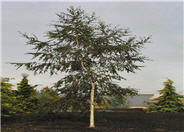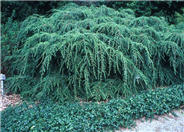
Common name:Colorado Spruce
Botanical name:Picea pungens
The Picea pungens is a tall evergreen tree that grows to 100' tall. It is broadly pyramidal in form, with foliage varying in shades of blues and greens. This is a highly combustible plant.

Common name:Purple-Leaf European Birch
Botanical name:Betula pendula 'Purpurea'
This broad tree will grow to about 40' tall and has medium-sized green leaves that have a purplish tint.

Common name:New Zealand Flax, Purple
Botanical name:Phormium tenax 'Atropurpureum'
Phormium tenax 'Atropurpureum' is an evergreen perennial. Big, dramatic plant composed of many swordlike, stiffly vertical leaves can reach 5' tall. Leaves are purple red. Flowers stems reach high above leaves, bearing clusters of 1"-2" blossoms in dark red.

Common name:Weeping or Sargent's Hemlock
Botanical name:Tsuga canadensis 'Pendula'
The dark green needles of this Tsuga are 1/2" long and are aranged paired and opposite, with a white band beneath. Its outer branchlets drop gracefully, and oval cones are produced from short stalks. On the older trees, the bark is deeply furrowed.
Once the conifer has shed its seeds in autumn, the cones will remain.

Common name:Hidcote English Lavender
Botanical name:Lavandula angustifolia 'Hidcote'
This is a slow growing lavender that grows to 1'-2' tall and wide,with violet flowers that bloom in spring and summer. It is drought tolerant, attracts hummingbirds and butterflies. Dried flowers are great in arrangements. This Lavender prefers full sun and is drought tolerant once it's established. It is also cold tolerant. Flowers are fragrant.
Photographer: GardenSoft
Incorporate compost 6" into your soil to retain water, reduce compaction, feed earthworms, and provide valuable nutrients to your plants.
Attract, or buy beneficial insects such as ladybugs and lacewings to control pest outbreaks in your garden.